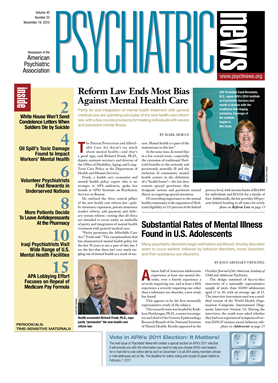Do Disasters Foster Drinking Problems?
What is the relationship, if any, between disasters and alcohol abuse? Carol North, M.D., chair of crisis psychiatry and a professor of psychiatry at the University of Texas Southwestern Medical Center in Dallas, and colleagues set about answering this question.
They merged data from 10 disaster-related studies that included about 700 individuals. The disasters studied included a tornado, an earthquake, a firestorm, a plane crash into a hotel, mass-murder episodes, and the Oklahoma City terrorist bombing.
After their data analysis, North and her coworkers concluded that these disasters did not lead most subjects to initiate or increase their drinking. Only 0.3 percent of the sample developed a new alcohol use disorder in the wake of a disaster. However, 83 percent of those in recovery from an alcohol use disorder did consume alcohol in the wake of a disaster.
So while disasters do not generally drive people to drink, they do seem to be capable of triggering relapses in people who already had an alcohol problem, the researchers concluded in their paper, which was published online October 4 in the Archives of General Psychiatry.
The study was funded by the National Institute of Mental Health and the Substance Abuse and Mental Health Services Administration.
Identifying Children Who May Be Gamblers
A study conducted on 163 children in Montreal, Canada, has found that impulsive behaviors in kindergarteners, such as inattentiveness, distractibility, or restlessness, presage buying lottery tickets, playing video poker, wagering on sports, or other gambling behaviors in the sixth grade.
The impulsive behaviors were evaluated with kindergarten-teacher ratings on the Social Behavior Questionnaire (age-determined norms). The link held even when possibly confounding factors such as gender, maternal education, family dysfunction, or parental gambling were considered.
Subjects in the prospective longitudinal study were part of the 1999 kindergarten cohort of the Montreal Longitudinal Preschool Study that was followed up in the sixth grade.
The researchers hope that others will attempt to confirm their findings with more rigorous population-based prospective analyses.
The study was headed by Linda Pagani, Ph.D., a professor in the University of Montreal's School of Psycho-Education, and was published in the August Canadian Journal of Psychiatry. The study was funded by Canada's Social Science and Humanities Research Council.
Seizure Drugs Can Influence Nicotine Metabolism
Two antiepileptic drugs—carbamazepine and oxcarbazepine—may speed up nicotine metabolism in individuals who smoke, a study reported September 14 in Cancer Epidemiology, Biomarkers, and Prevention suggests.
The study included 149 individuals with schizophrenia or bipolar disorder who were smokers. Eight were taking carbamazepine, six were taking oxcarbazepine, and 40 were taking valproic acid. The rest were not taking an antiepileptic drug.
Nicotine metabolism was found to be significantly higher in subjects taking carbamazepine or oxcarbazepine than in those taking valproic acid or no antiepileptic drug.
Whether carbamazepine and oxycarbazepine's ability to speed up nicotine metabolism influences how much a person smokes is unknown. But fast nicotine metabolizers are known to be more prone to smoking more and to developing nicotine dependence than slow metabolizers are.
A drawback of the study is that some of the subjects were using antipsychotics as well as antiepileptics. However, study results indicated that the antipsychotics had no influence on the subjects' nicotine metabolism.
The study was headed by Jill Williams, M.D., an associate professor of psychiatry at the UMDNJ-Robert Wood Johnson Medical School in New Jersey. It was funded by the National Institutes of Health.
Another Gene Variant Found to Influence Drug Response
During the past 15 years or so, the field of psychiatric pharmacogenetics has advanced considerably.
Variants in genes that code for drugmetabolizing enzymes in the liver are being found to influence those enzymes' handling of psychotropic medications in the body (Psychiatric News, May 20, 2005).
Variants of genes that code for certain brain receptors and transporters can also alter psychotropic medications' clinical outcome once they enter the brain. For instance, a variant of a gene that codes for a potassium channel in neurons has been found to influence antidepressant response (Psychiatric News, May 2, 2008). So have variants in the serotonin transporter gene (Psychiatric News, January 16, 2009).
And now a variant of a gene that codes for a membrane protein in serotonin and noradrenaline receptors has been found to influence the impact of the antidepressant nortriptyline, Robert Keers, a doctoral student in pharmacogenetics at the Institute of Psychiatry, King's College, London, and colleagues reported online September 8 in the Journal of Psychopharmacology.
Specifically, depressed patients who had two copies of a particular variant of the GNB3 gene experienced significantly greater appetite and sleep improvements from nortriptyline than did depressed patients who had only one copy or no copies of the variant.
Interestingly, the GNB3 variant that influenced nortriptyline action in depressed patients did not influence the action of another antidepressant, escitalopram, in them, the researchers found. This finding did not surprise him, Keers said, since nortriptyline works better than escitalopram on the somatic symptoms of depression such as sleep and appetite problems, and the GNB3 gene is crucial to the pineal gland, which is involved in the regulation of sleep and appetite by the release of melatonin.
Citing the potential clinical implications of their findings, Keers said, “Drug response is . . . influenced by multiple genetic and environmental factors. This means that the effects of one genetic variant, such as the one reported in this paper, are small. . . . Pharmacogenetics is, however, moving toward incorporating these and other polymorphisms to make more clinically useful predictive models. . . .”
The study was funded by the European Commission Framework.
